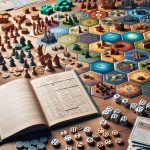Expanded Introduction
Pictionary is a classic game that has been around for decades. The game, which was invented in 1985 by Rob Angel, has become a favorite among adults and children alike due to its simple rules and easy-to-learn gameplay. It requires players to draw pictures instead of words to help their teams guess the word or phrase written on the card. This creates an electrifying atmosphere as each team tries to guess the clue faster than their opponents. As the game has continued to grow in popularity over time, many other board games similar to Pictionary have developed with different themes, rules, and categories of clues.
Benefits of Team Play
Team-based board games are a great way to bring people together and foster collaboration. Not only are they enjoyable and engaging, they also help build relationships, improve communication skills and develop an understanding of how teamwork can increase efficiency. Such games provide a framework for players to brainstorm ideas, solve problems and work towards common goals.
These board games also promote team bonding as well as the ability to think outside the box. Through their various challenges, they can encourage creativity while creating cooperative solutions that benefit everyone involved. In addition, such games provide an effective tool for teaching problem solving techniques and providing insight into different aspects of the game at hand. This can help teams develop innovative ways to approach tasks, allowing better results for all concerned.
Finally, team-oriented board games require just as much social interaction as physical activity; making them great exercise for memory, strategy and critical thinking skills. They bring people from all backgrounds together in a relaxed setting that encourages social growth and demands respect for each other’s opinions. Ultimately, this helps create meaningful conversations based on mutual understanding, appreciation and camaraderie that will be remembered long after the game is over.
Comparison Table
Game | Similarities to Pictionary | Differences from Pictionary
——————————————————————————–
HedBanz | Involves guessing words based on clues provided; Drawings/clues are limited to using pictures | Players wear a headband containing picture cards on their heads and guess the word without seeing it
Logo Board| Involves guessing words based on clues provided| Uses brand logos and commercial product logos as clues
Charades | Involves guessing words based on clues provided; Some can use drawings or symbols as clues | Words guessed are associated with actions which are acted out rather than drawn
Encore | Involved guessing words presented in phrases; Clues often use drawings or symbols as cues | Teammates must both guess the same phrase before progressing
Additional Games
The Game of Exquisite Corpse is a game similar to Pictionary. The goal of the game is to get a group of people to come up with a cohesive story, poem, or drawing by taking turns adding on sections. Each group member begins by creating either a drawing, phrase, or sentence without seeing what the other players have created. When each player has completed their section, the complete creative project can be evaluated by all those playing.
Time’s Up is another game that bears similarities to Pictionary. It is typically played with three different rounds where teams have one-minute each time around for guessing as many card clues as possible before time runs out. In each round the words being guessed change; in the first round players may guess celebrity names, in the second round characters from books/movies and TV shows and in the last round events, objects or places.
Expanded Conclusion
There are many different board games similar to Pictionary that provide an interactive and creative play experience. These often involve players drawing pictures or forming charades to guess popularly-recognized words or abstract concepts. Charades, the classic game involving silent story-telling, is a great jumping off point for these types of experiences. Another fun example is Telestrations, a combination of telephone and Pictionary wherein players have to repeat an original drawing through successive rounds until it returns to its original state. Reverse Charades provides all players with the same scene drawn at the start of each round and encourages them to guess as many answers as possible before time runs out, allowing multiple participants in at once instead of one. Finally, there’s Masterpiece, which tasks players with being ‘investors’ in paintings created by their teams in order to sell them for large amounts of imaginary currency while learning art history along the way!

I love playing all kinds of games – from classics like Monopoly to modern favourites like Ticket to Ride.
I created this blog as a way to share my love of board games with others, and provide information on the latest releases and news in the industry.





